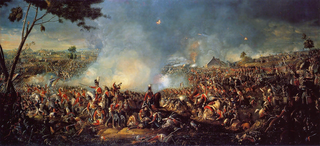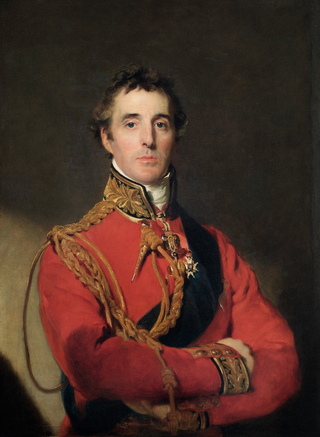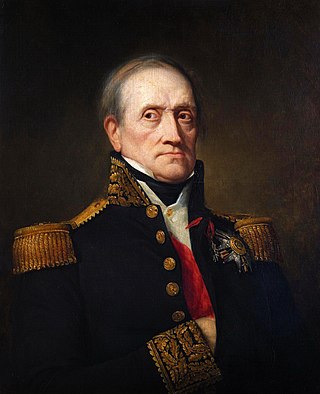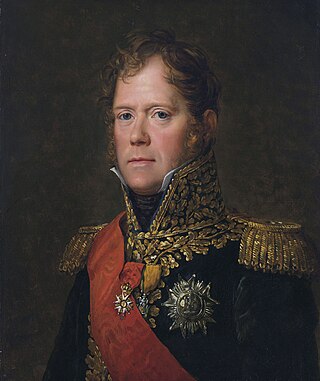Sources
| | This article about a German margrave is a stub. You can help Wikipedia by expanding it. |
Otto | |
|---|---|
| Margrave of the Nordmark | |
| Tenure | 10 September 1056 – 26 June 1057 |
| Died | 26 June 1057 Hausneindorf, Duchy of Saxony |
| Father | Bernard, Margrave of the Nordmark |
Otto (died 26 June 1057) was an illegitimate son of Bernard, Margrave of the Nordmark, and a Slav mistress whose name is unknown. He took the title march and claimed the Northern March following the death in battle of his half-brother William on 10 September 1056. However, he was opposed by Lothair Udo I and killed in battle near Hausneindorf the next summer.

The Battle of Waterloo was fought on Sunday 18 June 1815, near Waterloo, marking the end of the Napoleonic Wars. A French army under the command of Napoleon was defeated by two armies of the Seventh Coalition. One of these was a British-led force with units from the United Kingdom, the Netherlands, Hanover, Brunswick, and Nassau, under the command of the Duke of Wellington. The other comprised three corps of the Prussian army under Field Marshal von Blücher. The battle was known contemporarily as the Battle of Mont Saint-Jean in France or La Belle Alliance in Prussia.

The Battle of Agincourt was an English victory in the Hundred Years' War. It took place on 25 October 1415 near Azincourt, in northern France. The unexpected English victory against the numerically superior French army boosted English morale and prestige, crippled France, and started a new period of English dominance in the war that would last for 14 years until England was defeated by France in the Siege of Orléans in 1429.

Field Marshal Arthur Wellesley, 1st Duke of Wellington, was an Anglo-Irish statesman, soldier, and British Tory politician who was one of the leading military and political figures of 19th-century Britain, serving twice as prime minister of the United Kingdom. He is among the commanders who won and ended the Napoleonic Wars when the Seventh Coalition defeated Napoleon at the Battle of Waterloo in 1815.

Hannibal was a Carthaginian general and statesman who commanded the forces of Carthage in their battle against the Roman Republic during the Second Punic War.

The Battle of Trafalgar was a naval engagement that took place on 21 October 1805 between the British Royal Navy and the combined fleets of the French and Spanish Navies during the War of the Third Coalition of the Napoleonic Wars (1803–1815).

The Battle of Hastings was fought on 14 October 1066 between the Norman-French army of William, the Duke of Normandy, and an English army under the Anglo-Saxon King Harold Godwinson, beginning the Norman Conquest of England. It took place approximately 7 mi (11 km) northwest of Hastings, close to the present-day town of Battle, East Sussex, and was a decisive Norman victory.

Eugène Rose de Beauharnais was a French nobleman, statesman, and military commander who served during the French Revolutionary Wars and the Napoleonic Wars. Through the second marriage of his mother, Joséphine de Beauharnais, he was the stepson of Napoleon Bonaparte. Under the French Empire he also became Napoleon's adopted son. He was Viceroy of the Kingdom of Italy under his stepfather, from 1805 to 1814, and commanded the Army of Italy during the Napoleonic Wars. Historians consider him one of Napoleon's most able relatives.

Napoleon Bonaparte, later known by his regnal name Napoleon I, was a French emperor and military commander who rose to prominence during the French Revolution and led successful campaigns during the Revolutionary Wars. He was the leader of the French Republic as First Consul from 1799 to 1804, then of the French Empire as Emperor of the French from 1804 until 1814, and briefly again in 1815. His political and cultural legacy endures as a celebrated and controversial leader. He initiated many enduring reforms, but has been criticized for his authoritarian rule. He is considered one of the greatest military commanders in history and his wars and campaigns are still studied at military schools worldwide. However, historians still debate whether he was responsible for the Napoleonic Wars in which between three and six million people died.

The Battle of Austerlitz, also known as the Battle of the Three Emperors, was one of the important and decisive military engagements of the Napoleonic Wars. The battle occurred near the town of Austerlitz in the Austrian Empire. Around 158,000 troops were involved, of which around 24,000 were killed or wounded. The battle is often cited by military historians as one of Napoleon's tactical masterpieces, in the same league as other historic military battles like Cannae or Gaugamela. The military victory of Napoleon's Grande Armée at Austerlitz brought the War of the Third Coalition to an end, with the Peace treaty of Pressburg, signed by the French and Austrians later in the month. These achievements did not establish a lasting peace on the continent. Austerlitz had driven neither Russia nor Britain, whose armies protected Sicily from a French invasion, to settle. Meanwhile, Prussian resistance against the growing power of French military invasions in Central Europe caused another war in 1806, known as the War of the Fourth Coalition.

The Battle of Borodino took place near the village of Borodino on 7 September [O.S. 26 August] 1812 during Napoleon's invasion of Russia. The Grande Armée won the battle against the Imperial Russian Army, but failed to gain a decisive victory and suffered tremendous losses. Napoleon fought against General Mikhail Kutuzov, whom the Emperor Alexander I of Russia had appointed to replace Barclay de Tolly on 29 August [O.S. 17 August] 1812 after the Battle of Smolensk. After the Battle of Borodino, Napoleon remained on the battlefield with his army; the Imperial Russian forces retreated in an orderly fashion southwards. Because the Imperial Russian army had severely weakened the Grande Armée, they allowed the French occupation of Moscow, using the city as bait to trap Napoleon and his men. The failure of the Grande Armée to completely destroy the Imperial Russian army, in particular Napoleon's reluctance to deploy his Imperial Guard, has been widely criticised by historians as a huge blunder, as it allowed the Imperial Russian army to continue its retreat into territory increasingly hostile to the French. Approximately a quarter of a million soldiers were involved in the battle, and it was the bloodiest single day of the Napoleonic Wars.

André Masséna, Prince of Essling, Duke of Rivoli, was a French military commander during the French Revolutionary Wars and the Napoleonic Wars. He was one of the original 18 Marshals of the Empire created by Napoleon I. He was nicknamed l'Enfant chéri de la Victoire. He is often considered as one of the greatest generals of the Revolutionary and Napoleonic Wars.

Marshal General Jean-de-Dieu Soult, 1st Duke of Dalmatia was a French general and statesman. He was a Marshal of the Empire during the Napoleonic Wars, and served three times as President of the Council of Ministers of France.

The First Battle of Bull Run, called the Battle of First Manassas by Confederate forces, was the first major battle of the American Civil War. The battle was fought on July 21, 1861, in Prince William County, Virginia, just north of the city of Manassas and about thirty miles west-southwest of Washington, D.C. The Union Army was slow in positioning themselves, allowing Confederate reinforcements time to arrive by rail. Each side had about 18,000 poorly trained and poorly led troops. The battle was a Confederate victory and was followed by a disorganized post-battle retreat of the Union forces.

Michel Ney, 1st Prince de la Moskowa, 1st Duke of Elchingen was a French military commander and Marshal of the Empire who fought in the French Revolutionary Wars and the Napoleonic Wars.

The French Revolutionary Wars were a series of sweeping military conflicts lasting from 1792 until 1802 and resulting from the French Revolution. They pitted France against Britain, Austria, Prussia, Russia, and several other monarchies. They are divided in two periods: the War of the First Coalition (1792–1797) and the War of the Second Coalition (1798–1802). Initially confined to Europe, the fighting gradually assumed a global dimension. After a decade of constant warfare and aggressive diplomacy, France had conquered territories in the Italian Peninsula, the Low Countries and the Rhineland. French success in these conflicts ensured the spread of revolutionary principles over much of Europe.

Battle Royale is a 2000 Japanese action-thriller film directed by Kinji Fukasaku, and written by his son Kenta Fukasaku, based on the controversial 1999 novel by Koushun Takami. Starring Tatsuya Fujiwara, Aki Maeda, Tarō Yamamoto, and Takeshi Kitano, the film follows a group of junior-high-school students forced to fight to the death by the Japanese totalitarian government. The film drew controversy and was banned or excluded from distribution in several countries; Toei Company refused to sell the film to any United States distributor for over a decade due to concerns about potential controversy and lawsuits, until Anchor Bay Films eventually acquired the film in 2010 for a direct-to-video release.

The "Battle Hymn of the Republic", also known as "Mine Eyes Have Seen the Glory" or "Glory, Glory Hallelujah" outside of the United States, is an American patriotic song written by abolitionist writer Julia Ward Howe during the American Civil War.

The Battle of the Alamo was a pivotal event and military engagement in the Texas Revolution. Following a 13-day siege, Mexican troops under President General Antonio López de Santa Anna reclaimed the Alamo Mission near San Antonio de Béxar, killing most of the occupants. Santa Anna's refusal to take prisoners during the battle inspired many Texians and Tejanos to join the Texian Army. Motivated by a desire for revenge, as well as their written desire to preserve a border open to immigration and the importation and practice of slavery, the Texians defeated the Mexican Army at the Battle of San Jacinto, on April 21, 1836, ending the conquering of the Mexican state of Coahuila y Tejas by the newly formed Republic of Texas.

Claude-Victor Perrin, Duke of Belluno was a French military commander who served during the French Revolutionary Wars and the Napoleonic Wars. He was made a Marshal of the Empire in 1807 by Emperor Napoleon I.